

Planning for concept driven learning… – What Ed Said. Cross-posted at Inquire within, following on from Inquiry: to what end?
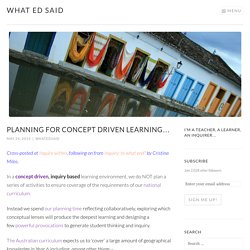
By Cristina Milos. Planning for learning… The way we plan PYP units of inquiry is different from the way many other teachers plan.
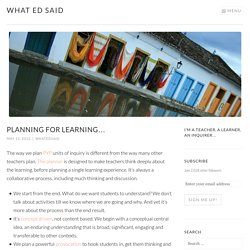
The planner is designed to make teachers think deeply about the learning, before planning a single learning experience. It’s always a collaborative process, including much thinking and discussion. We start from the end. What do we want students to understand? We don’t talk about activities till we know where we are going and why. We are trialling Managebac, an integrated management system for IB schools. Search Results for “how do you plan” – What Ed Said. We met this week for collaborative planning of a new unit of inquiry for the start of the new school year… Times have changed.
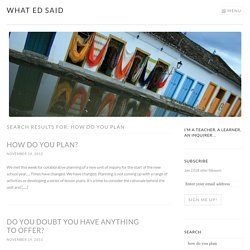
We have changed. Planning is not coming up with a range of activities or developing a series of lesson plans. Planning in response to learning… – What Ed Said. I borrowed a bit from a post I wrote last week at Inquire Within, but this one’s different… It’s a joy to visit the kindergarten room, where the 4 year olds have been inquiring into the needs of all kinds of living things.
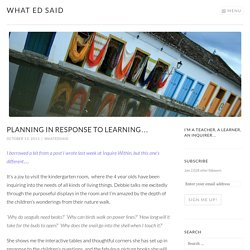
Debbie talks me excitedly through the purposeful displays in the room and I’m amazed by the depth of the children’s wonderings from their nature walk. ‘Why do seagulls need beaks?’ ‘Why can birds walk on power lines?’ ‘How long will it take for the buds to open?’ She shows me the interactive tables and thoughtful corners she has set up in response to the children’s questions, and the fabulous picture books she will read them to develop their thinking further. Kindergarten teachers like Deb excel at observing and recording student’s thinking and then creating relevant learning experiences in response. We used to spend a whole day (really) planning new units of inquiry in advance. What happens next? Like this: Like Loading... Planning for inquiry… – What Ed Said. ‘Language is a vehicle for communication and self expression.
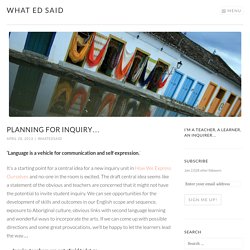
What place does student voice have in planning? As the children prepare for learning conferences, I started off the process not by asking them on what they learned but which unit they felt they gained the most from and which unit they felt needed improvement.
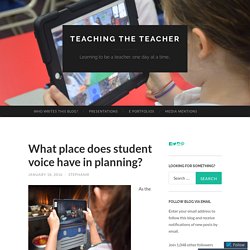
The children were thrilled to give feedback. More importantly, it was an opportunity for me to demonstrate the qualities I wish to see in my learners: reflection, initiative and the ability to take on feedback. At this point in the year we have completed three units of inquiry: Human exploration results in new discoveries.Energy is used (converted, transformed and controlled) to support human progress.Fashion expresses our views and beliefs. The class was divided in which unit they enjoyed most: “I liked that we could use our creativity and design clothes for the fashions shows (with some inspiration ) . 5 Templates to Use for Self-Directed Learning Projects. I’ve written man article about self-directed learning over the last couple of years, and more people are inquiring about simple steps to get started.
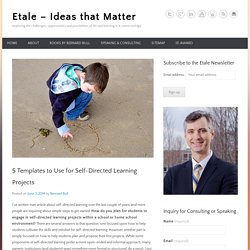
How do you plan for students to engage in self-directed learning projects within a school or home school environment? There are several answers to that question, one focused upon how to help students cultivate the skills and mindset for self-directed learning. However, another part is simply focused on how to help students plan and propose their first projects. While some proponents of self-directed learning prefer a more open-ended and informal approach, many parents, institutions (and students) want something more formal or structured. As a result, I put together the following sample planning documents, contracts, and project proposals.
I’ll offer one more qualification. Please do consider posting questions and feedback in the comment area. Related 5 Myths About Project-Based and Self-Directed Learning Schools October 29, 2013 In "blog" How do we assess understanding? – What Ed Said. Part of my role as Teaching and Learning Coordinator involves facilitating and supporting the planning of units of inquiry.
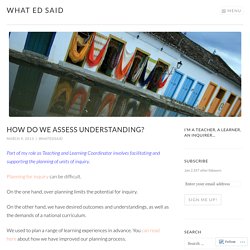
Planning for inquiry can be difficult. On the one hand, over planning limits the potential for inquiry. On the other hand, we have desired outcomes and understandings, as well as the demands of a national curriculum. Planning for inquiry – an opportunity for growth and inspiration. How healthy is your team planning? Over the last few weeks I have spent a lot of time ‘at the planning table’ with teams in several schools.

I always relish the opportunity to be part of a healthy collaborative planning session – I love the energy generated by ideas, the sense of possibility and the creative and social process that is authentic planning. I have also recently spent time in another institution – a hospital – caring for a family member. Listening to student voice… – What Ed Said.
Enthusiastic students from Years 4, 5 and 6 sit in a circle at the end of the day and share reflections on our Program of Inquiry.
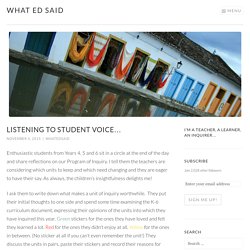
I tell them the teachers are considering which units to keep and which need changing and they are eager to have their say. As always, the children’s insightfulness delights me! I ask them to write down what makes a unit of inquiry worthwhile. They put their initial thoughts to one side and spend some time examining the K-6 curriculum document, expressing their opinions of the units into which they have inquired this year.